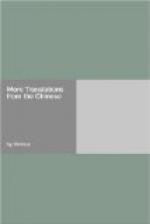Illness and idleness give me much leisure.
What do I do with my leisure, when it comes?
I cannot bring myself to discard inkstone and brush;
Now and then I make a new poem.
When the poem is made, it is slight and flavourless,
A thing of derision to almost every one.
Superior people will be pained at the flatness of the metre;
Common people will hate the plainness of the words.
I sing it to myself, then stop and think about it ...
* * * * *
The Prefects of Soochow and P`eng1-tse1[1]
Would perhaps have praised it, but they died long
ago.
Who else would care to hear it?
No one to-day except Yuuan Chen1,
And he is banished to the City of Chiang-ling,
For three years an usher in the Penal Court.
Parted from me by three thousand leagues
He will never know even that the poem was made.
[1] Wei Ying-wu, eighth century A.D., and T`ao Ch`ien, A.D. 365-427.
[25] WINTER NIGHT
[Written during his retirement in 812]
My house is poor; those that
I love have left me;
My body sick; I cannot join
the feast.
There is not a living soul
before my eyes
As I lie alone locked in my
cottage room.
My broken lamp burns with
a feeble flame;
My tattered curtains are crooked
and do not meet.
“Tsek, tsek” on
the door-step and window-sill
Again I hear the new snow
fall.
As I grow older, gradually
I sleep less;
I wake at midnight and sit
up straight in bed.
If I had not learned the “art
of sitting and forgetting,"[1]
How could I bear this utter
loneliness?
Stiff and stark my body cleaves
to the earth;
Unimpeded my soul yields to
Change.[2]
So has it been for four hateful
years,
Through one thousand and three
hundred nights!
[1] Yen Hui told Confucius that he had acquired the “art of sitting and forgetting.” Asked what that meant, Yen Hui replied, “I have learnt to discard my body and obliterate my intelligence; to abandon matter and be impervious to sense-perception. By this method I become one with the All-Pervading.”—Chuang Tzu, chap. vi.
[2] “Change” is the principle of endless mutation which governs the Universe.
[26] THE CHRYSANTHEMUMS IN THE EASTERN GARDEN
[A.D. 812]
The days of my youth left
me long ago;
And now in their turn dwindle
my years of prime.
With what thoughts of sadness
and loneliness
I walk again in this cold,
deserted place!
In the midst of the garden
long I stand alone;
The sunshine, faint; the wind
and dew chill.
The autumn lettuce is tangled
and turned to seed;
The fair trees are blighted
and withered away.
All that is left are a few
chrysanthemum-flowers
That have newly opened beneath




